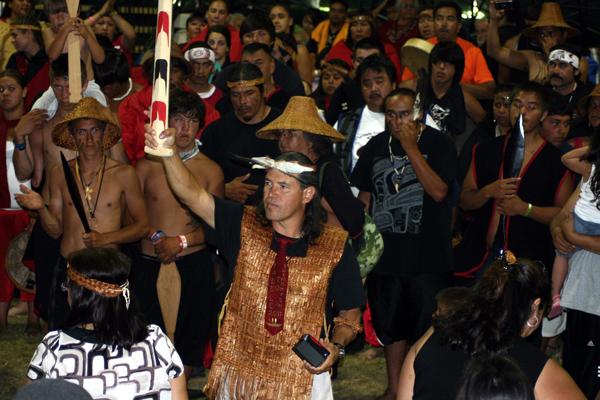
Swinomish Chairman Brian Cladoosby holds a paddle gifted to him by the Quileute Nation, July 29, 2011, during the Canoe Journey/Paddle to Swinomish. Cladoosby is a candidate for president of the National Congress of American Indians.
June 26, 2013 ICTMN
Swinomish Chairman Brian Cladoosby, who has long worked to strengthen economic conditions and stop ecological degradation in Coast Salish country, announced his candidacy June 25 for president of the National Congress of American Indians.
The election will take place during NCAI’s 70th annual convention October 13-18 in Tulsa, Oklahoma.
If elected, Cladoosby would continue to serve as chairman of the Swinomish Tribe, he said in a pre-announcement interview. He would be the fourth indigenous leader from Washington state to serve as NCAI president.
“After 29 years of service on the Swinomish Indian Senate and 17 years of the best job in the world, the chairman of the Swinomish Indian Tribal Community, I feel called by our Creator to serve Indian people across our country,” he wrote on a Facebook page established for his campaign.
“I believe that we live in historic times. When my grandfather’s grandfather signed the Point Elliott Treaty [in 1855], he probably could not have imagined the world that we live in today, but he thought about my grandchildren, Bella and Nathaniel. They are the seventh generation since our treaty was signed. Today, we are called to think about the seven generations to come and the world we will leave for them.”
Cladoosby said indigenous nations “have been blessed by our Creator with tremendous gifts” with which to confront the challenges of the day: Tribal governments’ ability to tax activities within reservation borders, ensuring there are educational opportunities for young people and quality health services for families and elders, protection of natural resources, and responding appropriately to climate change.
“Our teachings, our spiritual ways, the wisdom of our elders, the inspiration of our children and strong tribal leaders from across Indian country lift us up and give us strength to meet these challenges every day,” he said.
Cladoosby said he announced his candidacy only after getting the support of his wife, Nina, and the Swinomish Senate.
“I know that without them and their support, I could not begin to think about serving as president of NCAI. In the coming months, I ask for your support, your prayers and your ideas. Together, we can build the tomorrow that the grandchildren of our grandchildren can be proud of.”
Cladoosby served as president of the Affiliated Tribes of Northwest Indians in 2008-11, and served on NCAI’s board of directors and on Environmental Protection Agency’s National Tribal Operations Committee. He is also active on the Skagit Council of Governments, an organization of local governments in Skagit County, Washington.
After the November general election, incoming state Attorney General Bob Ferguson appointed Cladoosby to his transition committee, which reviewed the structure of the Attorney General’s Office, its budget, and goals for the upcoming legislative session.
On December 5, Cladoosby introduced President Barack Obama at the White House Tribal Nations Conference, calling Obama – an adopted member of the Crow Nation – our “first American Indian president.” (Related story: Obama Does It Again: 2012 White House Tribal Nations Conference)
As Swinomish chairman, Cladoosby has overseen a careful strategy of economic growth that has resulted in the tribe becoming one of the five largest employers in Skagit County.
The tribe owns the golf- and entertainment-oriented Swinomish Casino and Lodge overlooking Padilla Bay, two gas stations and convenience stores, a cannery that processes salmon and shellfish for a global market, and a Ramada Hotel in Ocean Shores on the Washington coast. Swinomish’s Chevron Gas Station is, according to the tribe, the largest-volume Chevron station on the West Coast.
According to the tribe’s website, Swinomish employs more than 250 people in tribal government and approximately 300 people in its economic enterprises.
Swinomish is also an important voice on environmental issues: recent local initiatives include restoring indigenous ownership and stewardship of Kiket Island, and restoring the shoreline and developing a park and native-plant garden on Swinomish Channel.
In 2008, Cladoosby helped organize the Canoe Journey Water Quality Project in collaboration with other Coast Salish nations and the U.S. Geological Survey. Canoes participating in the annual Canoe Journey carry probes and global positioning systems that record temperature, salinity, pH levels, dissolved oxygen and turbidity in the Salish Sea. The data is being processed and mapped so researchers can identify patterns and trends in sea conditions. These efforts were honored in 2009 by the U.S. Secretary of the Interior; in 2012, Cladoosby was one of five finalists for the Ecotrust Indigenous Leadership Award. (Related story: Canoe Journey Could Provide Picture of Inland Sea’s Health)
“Mr. Cladoosby has been a huge supporter for our Northwest tribes and I hope we support someone who actually sees what we are needing as tribes in the Northwest and Alaska,” a supporter wrote on Facebook, calling Cladoosby “One of the Great Native Leaders out there fighting our good fight!”
Chickasaw Nation Lt. Gov. Jefferson Keel is finishing his second as president. According to its constitution, NCAI’s purpose is to “serve as a forum for unified policy development among tribal governments in order to: (1) protect and advance tribal governance and treaty rights; (2) promote the economic development and health and welfare in Indian and Alaska Native communities; and (3) educate the public toward a better understanding of Indian and Alaska Native tribes.”
NCAI has a staff of 33.
